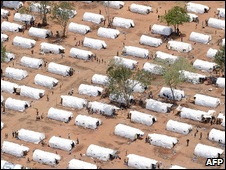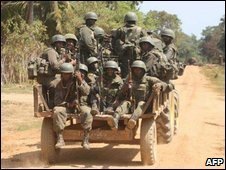 The UN has warned that "donor fatigue" in Sri Lanka has meant that it has received only 24% of the donor funds it needs to help displaced Tamils.
The UN has warned that "donor fatigue" in Sri Lanka has meant that it has received only 24% of the donor funds it needs to help displaced Tamils.
It has warned that the needs of Tamils wanting to return to their homes are still huge a year after the war ended.
Meanwhile the government has not commented on a report by a leading think-tank which says more civilians were killed than previously thought.
And the army has had to postpone a victory parade because of bad weather.
Colombo has recently been hit by several days of heavy rain, turning the parade ground into a quagmire and preventing troops from practising their marching routines. It is now due to take place next week.
‘Uphill battle’
About 300,000 people were forced to flee their homes and seek refuge in camps in the north of Sri Lanka at the height of the war, which ended on 19 May last year.
 The UN says it is facing an "uphill battle" as it strives to facilitate the return of thousands of war-displaced Tamil people to their homes, because many have been destroyed and their villages and fields mined.
The UN says it is facing an "uphill battle" as it strives to facilitate the return of thousands of war-displaced Tamil people to their homes, because many have been destroyed and their villages and fields mined.
"There has been a serious shortage of funding from donors and if the international community doesn’t come forward soon, we are likely to run out of money for some key needs by June," Sri Lanka UN Humanitarian Co-ordinator Neil Buhne said.
He said that more than 60% of homes in the north had been seriously damaged by the fighting – and the number of people affected combined with the impact on the local economy made the situation more grave than it was in the aftermath the December 2004 tsunami, which killed 35,000 people.
A report by influential think-tank the International Crisis Group (ICG) says that there should be an independent international inquiry into possible war crimes by both sides.
The BBC’s Charles Haviland in Colombo says that the report comes down most heavily on the government, saying there is evidence that it intentionally shelled civilians, hospitals and humanitarian operations.
The report says eyewitness evidence suggests that at least 30,000 civilians were killed in the latter stages of the conflict, and countless others were either wounded or deprived of food and medicine.
The authorities have not commented specifically on the ICG report but have repeatedly denied inflicting civilian casualties.
Defence Secretary Gotabhaya Rajapaksa, who masterminded the war effort, wrote in a Sunday newspaper that, when confronted with civilian areas, the military banned air bombing, artillery and mortar fire.
He said that rescuing trapped civilians had been a key priority.
(For updates you can share with your friends, follow TNN on Facebook and Twitter )
